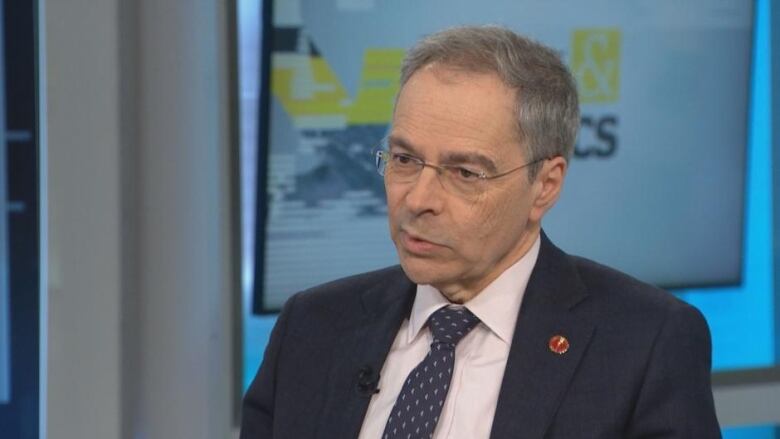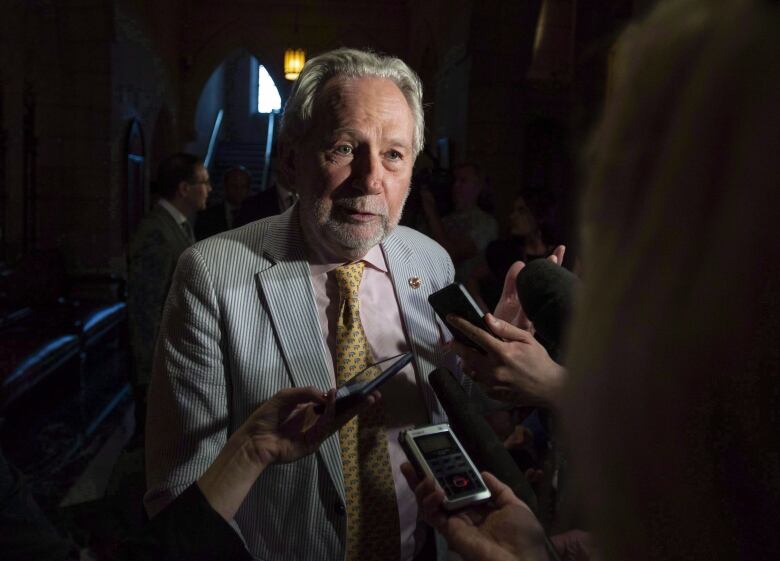Progressive Senate Group back from the dead as another Independent defects
Quebec Sen. Pierre Dalphond's floor-crossing gives Progressives 'recognized' status in upper house

Quebec Sen. Pierre Dalphond is leaving the Independent Senators Group (ISG) behind to become a member of the Progressive Senate Group, a caucus composed largelyof former Liberal senators.
With the addition of Dalphond, the Progressive Senate Group now has nine members enough to be recognized as an official caucus in the upper house.
The designation gives Progressive senators access to committee seats which are highly prized by members of the upper house and more research money.
Dalphond, a former judge appointed by Prime Minister Justin Trudeau in June 2018, has been an advocate for stricter gun control legislation in the Red Chamber.
Since his election in 2015, Trudeau has tried to strip the place of partisan appointees who sit as members ofparty caucuses.
Trudeau dropped all Liberal senators from the national caucus in 2014, at the height of the Senate expenses scandal.
The Liberal Senate caucus rebrandeditself last fall as the Progressive Senate Group, hoping that a name change would attract new senators who were leery of joining a caucus with past partisan ties, given the prime minister's push for more independence.
And we in the @Prog_Senat are very pleased to be working with you @DalphondPierre https://t.co/qlsq7ORDqV
—@SenatorCordyFollowingits relaunch, the caucus lost its "recognized" status after P.E.I. Sen. Percy Downe left for the small-c conservative Canadian Senators Group(CSG) in November and two mandatory retirements in January pushed membership below the nine-member threshold required for official recognition.
Recent defections from ISG
The ISG was established in 2016 to give non-partisan Trudeau appointees a home in the upper house. Nearly half of all sitting senators are members of the ISG.
But there have been a number of defections from the ISG in recent months.
Seven ISG members left in November to form the CSG. Manitoba Sen. Patricia Bovey also jumped to the Progressives earlier this month, paving the way for other liberal-minded senators to make the switch.
Ontario Sen. Peter Harder, the former government representative in the Senate, joined the Progressives last week.

In making the move, Harder said he worried that partisanship has been replaced by "majoritarianism" in the Senate due to B.C. Sen. Yuen Pau Woo's leadership ofthe ISG.
In an interview with CBCNews Thursday, Dalphond said he was motivated in part to make the switch because of some of Woo's actions in recent weeks, which he said undermined the equality of all senators.
In an effort to stop defections from his group, Woopassed a motion in the chamber(before its pandemic-imposedrecess began)to strip committee seats from members who leave a recognized caucus or group, with a few exceptions. The opposition Conservatives also supported the new rule.
'The straw that broke the camel's back'
Much of the Senate's "sober second thought" function is carried out at committees; the passage of Woo's motion creates anincentive for senators to stayput to keep a committee seat.
"That was the final straw that broke the camel's back," Dalphond said in an interview with CBC News. "For me, that was too much."
Even in the old days when theSenate was dominated by a Liberal and Conservative duopoly, he said,senators could keep their committeeseats if they left a caucus.
The former jurist said he became a senator to help reform a chamber that has been beset by scandal for years but he said the ISG leadership isreplicating some of the tactics employed in the past by partisan caucuses to amass power or block opposition.
"This is really going backward in a very shocking way and that was not adequately discussed among members," Dalphond said of Woo's motion.
"The ISG was supposed to be a group without a leader where each member is free and there's no whip and collegiality should be the driving feature. Perhaps it's grown too big. Things become too top-down, unfortunately."
Dalphond said he's happy to sit in a group that includescelebrated Indigenous leaders and experienced senators who know how to get things done.
"For me, standing for my principles is more important than group affiliation," he said.
He said he agreed with Harder's claim that majoritarianism has morphed into an ideology of sorts in the upper house as the ISG demands a majority of seats on all committees at the expense of smaller groups like the Progressives.
He also took issue with the ISG using its standing as thelargest group to push through its preferred choice for Speaker pro tempore(the deputy Speaker), Sen.Pierrette Ringuette,instead ofholding a secret ballot vote.
Woo also introduceda motion in December 2019that would strip references to "opposition" and "opposition leader" from the Senate rules a proposal that outraged the Conservatives because theyfear Woo is trying to paper over theexistence of an officially recognized opposition in the chamber.
In an interview, Woo strongly disagreed with some of the criticism levelled at him by his former caucus mate.
"I cannot think of one example where the ISG hasused its majoritarianpower to change a fundamental practice of the Senate. I reject that entirely," he said.
He said he moved the motion to strip committee seats from defectorsto preserve procedural fairness,and it was accepted by the "vast majority of our members."

He said he's not trying to permanently chain people to the ISGby dangling the threat of taking their committee seats away.
"Sen.Dalphond has left so it's obviously a redherring. He has clearly decided to leavein spite of this provision," Woo said. "He's refuted his own point by doing so."
He said, before the recent defections,the ISG offered 13 committee seats to non-affiliated senators like theProgressives (they accepted only six of those seats, he said)and he has shown a willingness to negotiate when there's disagreement.
"The whole narrative that the ISG has been excluding non-affiliated senators and withholding committee positions is untrue.The actual reality of the Senate today is that we have a tyranny of the minority," Woo said, citing privileges reserved for the government caucus which, after Trudeau's reforms, has just three members led by a representative and the Conservative opposition.
The rules of the Senatestill reserve for government and opposition leaders some important privileges including considerably longer speaking times on bills and, for the whips, other chamber functions such as decidingjust how long the bells should ring before a vote is held. Hours-long bells in the last Parliament pushed some sittings late into the night.
"If anything, the current practice of the Senate is that there is an abuse by the minority of their special privileges and rules and rights," Woo said.













_(720p).jpg)


 OFFICIAL HD MUSIC VIDEO.jpg)
.jpg)



























































































